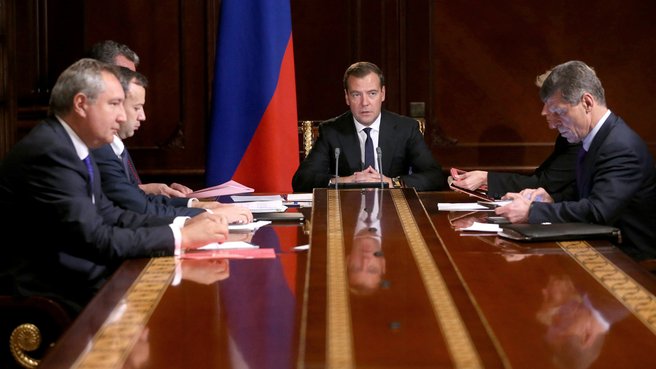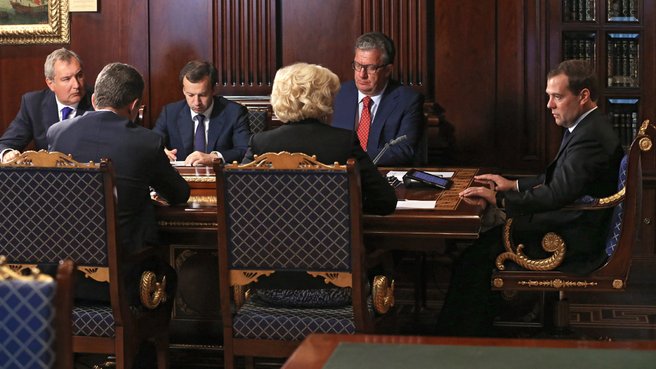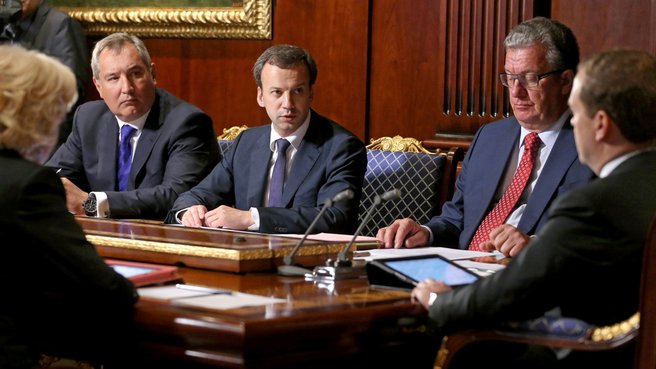The Prime Minister has signed Government resolutions on improved energy savings and the phased-in introduction of reduced rates with consumption limits. The meeting participants also discussed the supervision of the state programmes subsidising passenger air operations in the Volga Federal District by deputy prime ministers
Transcript:
Dmitry Medvedev: I have several announcements to make. First of all, I have divided responsibilities between the deputy prime ministers to supervise the implementation of state programmes. Each of those present will be coordinating this work based on their competence. Initially, we agreed that state programmes are major tools of the Government. We have invested a great deal of effort into adopting them and actually putting them into practice. There is still a lot to do in order to make sure these state programmes bring results.
Let me remind you that we have already adopted 40 of the 43 state programmes and that the work continues. Of course, it’s very important that the financial aspect doesn’t hinder the implementation of state programmes. Therefore, it’s your responsibility as deputy prime ministers to make sure the programmes receive sufficient and timely funding. The efficiency of these programmes is one of the conditions for successful administration of the budget for the next two years. As you remember, we have agreed that the regional budgets will also be closely linked with the state programmes. In a nutshell, this issue requires regular monitoring and discussion.
Dmitry Medvedev: "We have already adopted 40 of the 43 state programmes and that the work continues. <...> The efficiency of these programmes is one of the conditions for successful administration of the budget for the next two years."
Another announcement concerns the Government resolution on allocating subsidies for air travel in the Volga Federal District – specifically, for the pilot programme that is now taking place there.
Currently, people with low or no income receive a 50% discount on domestic flights that is compensated by the Government. Additionally, airlines opening new routes and increasing the frequency of flights will be entitled to Government subsidies. Mr Dvorkovich, please give us more details.
Arkady Dvorkovich: Mr Medvedev, colleagues. This year, the Government has adopted two resolutions aimed at developing inter-regional passenger service. The first resolution was adopted in January with regard to the pilot programme of subsidised passenger service in the Volga Federal District. The second one was adopted in June and covers the other districts. The resolutions introduce two different financial incentives. One proposes subsidies of 50% for air fares. The other offers subsidies on connecting flights through certain hubs in various regions.
As proposed and supported by the officials of the Volga Federal District, the regions of the district and Presidential Envoy to the Volga Federal District, the resolution you signed last week introduced the itinerary subsidy in addition to the passenger subsidy. This will make air travel much more affordable for medium-income families.
Arkady Dvorkovich: "This year, the Government has adopted two resolutions aimed at developing inter-regional passenger service. The first resolution was adopted in January with regard to the pilot programme of subsidised passenger service in the Volga Federal District. The second one was adopted in June and covers the other districts. The resolutions introduce two different financial incentives. One proposes subsidies of 50% for air fares. The other offers subsidies on connecting flights through certain hubs in various regions."
Now, several months into the project, we can see that the decision was correct. Traffic volume has increased by 150% year-on-year, which is 40% of last year’s total volume in only two months. We believe that if this pilot programme is extended until the end of the year and at the same time supplemented with more funding options, the total number of passengers could reach 90,000, which is extremely good for this region. Moreover, the airlines are extensively purchasing new equipment, mostly foreign planes so far. However, talks are in progress regarding localised production of this equipment in Russia. The demand is higher now as a result of the subsidy initiatives. It is becoming more beneficial for manufacturers to start production in Russia.
Dmitry Medvedev: What aircraft can be localised here?
Arkady Dvorkovich: Currently the most active negotiations are being held in relation to the L-410 which is produced in the Czech Republic. The owners are Russian investors. Apart from that, talks are under way with Canadian manufacturers on partial localisation in Russia for certain types of planes.
Mr Rogozin and I have been cooperating on this, and the Ministry of Industry and Trade is involved as well. We think that the negotiating will be over later this year and an agreement will be signed in 2014.
But these projects and directives are valid for one year. We are planning to discuss the first results of these pilot projects before mid-September and suggest decisions for next year, which the Government could approve in order to go on with the programme subsidies.
Dmitry Medvedev: "Among the documents that have been signed, let me mention a directive with respect to the preparations for the World Football Championship in 2018 and the FIFA Confederations Cup in 2017. For us, these are very important competitions and events and therefore we have approved a plan to prepare for these competitions."
Dmitry Medvedev: All right. Please report on this later.
Among the documents that have been signed, let me mention a directive with respect to the preparations for the World Football Championship in 2018 and the FIFA Confederations Cup in 2017. For us, these are very important competitions and events and therefore we have approved a plan to prepare for these competitions. The Deputy Prime Ministers in charge of organising these undertakings or supervising sports should note that the documents have been published and should be implemented.
Yet another issue is about the preparations for the autumn and winter seasons and electricity savings. I signed two directives the other day, which are directly related to this subject. The first one concerns a list of measures to save electricity and enhance energy efficiency, which includes both regional and municipal programmes. The other one is about the step-by-step introduction of the social power consumption rate in each constituent entity of the Russian Federation. This is a complicated subject that requires specific focus. After this meeting we’ll hold a separate meeting on housing and utilities. Nevertheless, Mr Kozak, please make a brief report on both preparations for winter and the directives I mentioned.
Dmitry Kozak: With regard to preparations for the winter period, we held the traditional July meeting (we hold it with regional leaders every year) on Friday. In general, the preparations for the 2013-2014 autumn-winter period do not present any cause for concerns: the preparation of the utilities and energy sector is proceeding at a faster rate compared to the same period in 2012 and 2011.
Dmitry Medvedev: Why is that? Is that because everyone is doing their job so well now?
Dmitry Kozak: For four years now, we have been evaluating and spurring on the work of…
Dmitry Medvedev: So, this is the result of your efforts?
Dmitry Kozak: … regional leaders. We assess their efficiency twice a year in terms of their level of preparedness for the winter and the autumn-winter period. This information is publicly available. This encourages regional leaders to work better. The number of accidents and emergencies has been declining each year. Clearly, they can’t be avoided altogether, because the infrastructure is worn out, but the work is going quite well.
The only problem (not a problem, really, because it’s too early to talk about it) is that the amounts of purchased liquid and solid fuel are slightly below last year’s level. According to preliminary information, this is due to fuel carryovers from last year’s warm winter. The Ministry of Energy and the Ministry of Regional Development have been instructed to inspect regions with inadequate amounts of purchases and, together with the regional leaders, prepare a report. It's only five regions. Overall, the situation is normal, and we’ll keep an eye on it.
The Ministry of Transport was instructed to provide assistance in the delivery of liquid and solid fuels to the Russian Far East and the Far North. The regional authorities are working on getting utilities ready for the winter and providing backup sources of power for socially significant and critical facilities, as well as developing, approving and conducting training programmes for emergency response teams in order to ensure their coordinated work. Also, plans are in place to promote energy efficiency in the housing and utilities sector. Notably, this year, there are fewer complaints from the regions regarding the winterisation of Defence Ministry facilities. As you may recall, we worked on this together. This work is on track, and all the governors have been instructed to monitor Defence Ministry facilities to make sure they are ready for the winter in time.
With regard to the norm for the consumption of housing and utilities services, we have been conducting an experiment to introduce a social norm for energy consumption in seven pilot regions since January 1. Four regions have introduced such a norm of their own accord, and three – the Oryol, the Rostov and the Samara regions – are new to this list.
According to the recently signed directive, beginning September 1 (tariffs for housing and utility services, including electricity, were increased on July 1) the regions with these newly introduced social consumption norms will see lower rates for electricity consumed within the established norm and higher rates for electricity consumed above the norm. This should encourage energy conservation and the affordability of these services in these areas.
In accordance with the Government decision, regional leaders are responsible for establishing social consumption norms. They need to make sure that over 70% of the population fall within the range established by the consumption norm. Therefore, if this works well in the regions beginning September 1, we’ll extend this experiment to other Russian regions. A similar experiment involving norms for water consumption will be carried out in 2014, first as a pilot project and then in 2015 throughout the country. If we organise this work properly, and the people with consumption levels within the social norm pay less for utilities, then this experiment will be a success and we will be able to encourage the entire population to save energy.
Dmitry Medvedev: Experiments need special oversight. This is a good and sensible idea, but we still have to see how it works. Therefore, we must monitor this experiment as it unfolds, all the more so since, as you rightly noted, such rules already exist in certain regions. On the other hand, the major challenge is typically the details. If it’s necessary to adjust things, it should be done quickly and, of course, compliance with regional rules should be monitored.
Dmitry Kozak: We are working on it.
<…>















